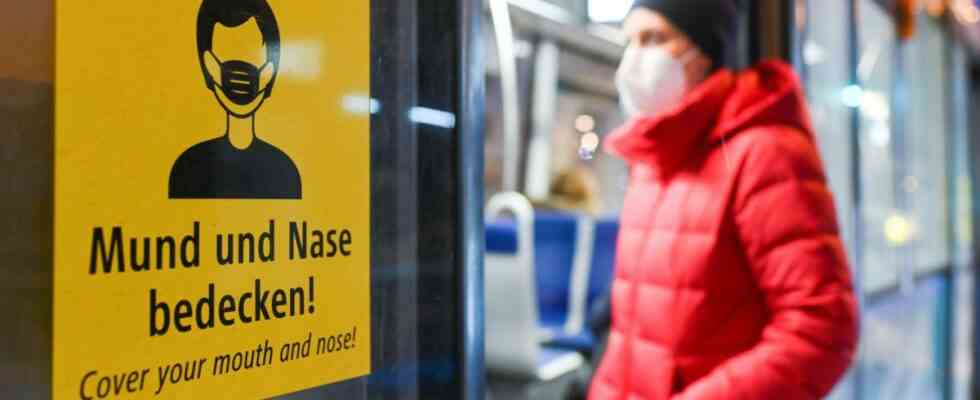While there is still nothing to be heard from other countries, Bayern are once again the first. Late on Tuesday morning, the decision from the cabinet meeting leaked out: anyone who drives buses, regional trains or trams in Bavaria no longer has to wear a protective mask from this Saturday. At noon it became known that the mask requirement would also fall in Saxony-Anhalt, even on Friday, one day earlier than in Bavaria. But by then the headlines on the internet have already been written. “Bavaria is pushing forward!” It says, as is so often the case in the corona pandemic.
The end of the mask requirement had become apparent. Prime Minister Markus Söder (CSU) had already said in mid-November that the rule would “soon no longer be appropriate”. However, it was unclear whether the mask requirement would fall immediately or only in the new year. Because of the currently low number of corona infections, the state government has now decided to end it quickly. The Bavarian Infection Protection Ordinance will be extended beyond November 9th, but the mask requirement in local public transport will be removed.
Health Minister Klaus Holetschek (CSU) speaks of a “deliberation process” after the cabinet meeting. And that the decision was “not easy” for him. There are “always arguments” both for and against the obligation to wear masks. It’s like this: the low corona numbers are offset by a wave of flu, and children’s hospitals are also heavily burdened because the wave of infections with the respiratory syncytial virus (RSV) is unusually strong this year. And yet, in the balance, for Holetschek “the proportionality of this measure is no longer given”. Meanwhile, Prime Minister Söder writes on Twitter about “more personal responsibility”. Instead of an obligation, there will only be “a recommendation” to wear the mask on buses and trains in the future.
Ruth Waldmann, on the other hand, finds it “very questionable” to lift the mask requirement now of all times because “the clinics send SOS and are overrun by people with respiratory diseases”. The health policy spokeswoman for the SPD parliamentary group sees “no reasonable justification” for the state government’s step. According to Waldmann, it’s “more about symbols in the political bazaar” between the CSU and the Free Voters, who had been pushing their coalition partner for a long time to overturn the mask requirement. Now a recommendation is “made by people who don’t wear a mask themselves,” says Waldmann – probably in reference to Söder, who has not worn mouth and nose protection at public appearances for some time. “Not credible,” says the SPD politician.
The FDP, on the other hand, is pleased that the mask will no longer be worn on local public transport – after more than two and a half years. As a reminder, the state government made masks compulsory in April 2020. The abolition that has now been decided is “a sensible decision,” says Martin Hagen, leader of the FDP parliamentary group in the state parliament. He thinks that Federal Health Minister Karl Lauterbach (SPD) “should now follow the Bavarian example and also end the nationwide mask requirement on long-distance trains”. Long-distance rail transport is a matter for the federal government, where the mask requirement continues to apply, according to the current status until April 2023.
The head of the state chancellery justifies the “special path” with the low incidence of corona
Other federal states see this as a reason to maintain the mask requirement in public transport. If this were omitted, it would be “difficult to explain to citizens why they have to wear a mask on long-distance trains,” said a spokeswoman for the North Rhine-Westphalian Ministry of Health on Tuesday. Baden-Württemberg also wants to stick to the mask requirement at least until the end of the year. It would have made sense to coordinate this issue with Bavaria, said Prime Minister Winfried Kretschmann (Greens). “We just didn’t get together.”
State Chancellery Head Florian Herrmann (CSU) justifies the fact that the Free State is going its own way with the fact that Bavaria was “in 16th place” in the country ranking of corona incidences on Tuesday, the last place, the Bavarian incidence (107.9) is significantly lower than the national average (204.2). It’s all nonsense, says SPD politician Waldmann, “the incidences have long since ceased to be meaningful.” Health Minister Holetschek meanwhile emphasizes that in 23 of the 27 EU countries there is no longer a mask requirement. And he gives numbers beyond the incidence to illustrate the waning of the pandemic. Accordingly, people infected with corona (six percent) no longer account for the highest proportion of respiratory diseases. The proportion of influenza (36) and the RS virus (19) is now higher. A mask requirement to protect against the corona virus is therefore no longer proportionate, says Holetschek.
Especially with regard to the RS virus and the children’s hospitals, the minister admits that “we have a situation that is very tense”. The State Office for Health and Food Safety (LGL) will therefore advise what can be done about this, for example by “controlling the flow of patients” between the hospitals. In addition, Holetschek announced that he would make five million euros available to the Bavarian children’s hospitals “in the short term” for instruments and “to bring relief to the area”.
While the end of the Bavarian mask requirement in local public transport is now imminent, it will generally apply beyond December 9th in particularly sensitive areas – the state government also decided this on Tuesday by extending the current Infection Protection Ordinance. In addition to medical practices, this includes hospitals and nursing homes, in which there are still mandatory tests.

